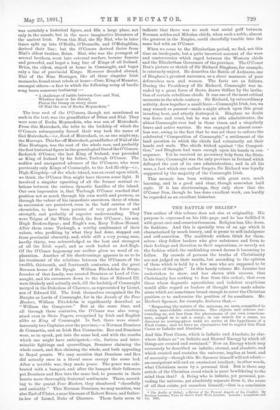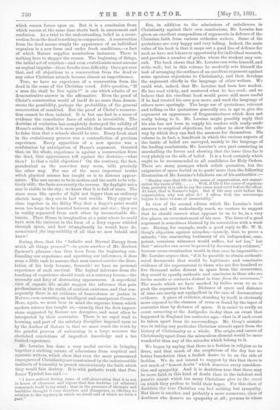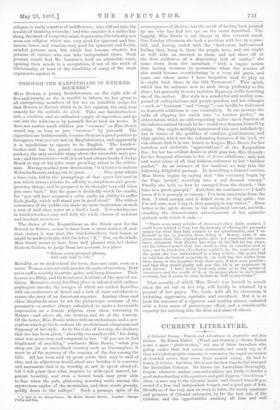THE BATTLE OF BELIEF.* THE author of this volume does
not aim at originality. His purpose is expressed on his title-page, and he has fulfilled it with great care and conscientiousness. Religion has, like dress, its fashions. And this is specially true of an age which is characterised by much luxury, and is prone to self-indulgence and self-assertion. The multitude seldom think for them- selves : they follow leaders who give substance and form to their feelings and direction to their aspirations, or merely set the fashion which the unthinking crowd deems it becoming to follow. By crowds of persons the truths of Christianity are not judged on their merits, but according to the opinion of them which is held by a few men who are supposed to be "leaders of thought." In this handy volume Mr. Loraine has undertaken to show, and has shown with success, that Christianity has nothing to fear from this ordeal ; that even those whom dogmatic agnosticism and indolent scepticism would alike regard as leaders of thought have made admis- sions which are sometimes broad enough to cover the Christian position or to undermine the position of its assailants. Mr. Herbert Spencer, for example, declares that,— "Respecting the nature of the universe, we seem committed to certain unavoidable conclusions. The objects and actions sur- rounding us, not less than the phenomena of our own conscious- ness, compel us to ask a cause ; in our search for a cause, we discover no resting-place until wo arrive at the hypothesis of a First Cause ; and we have no alternative but to regard this First Cause as Infinite and Absolute."
And this First Cause, which is Infinite and Absolute, he else- where defines as " an Infinite and Eternal Energy by which all things are created and sustained." Now an Energy which may accurately be described as infinite, eternal, and absolute, and which created and sustains the universe, implies at least, and of necessity—though this Mr. Spencer himself will not admit— an omnipotent will and an omniscient intellect; in other words, what Christians mean by a personal God. But is there any article of the Christian creed which is more bewildering to the mind than that ? A Being who is infinite, yet personal, per- vading the universe, yet absolutely separate from it, the cause of all that exists, yet causeless himself,—that is a conclusion
• The Battle of Belief: a Review of the Preeent Aspects of the Conflict, By Nevison Loraine, Vicar of Urove Park West, London. London : Longman:3 and Co. 1 1.
which reason forces upon us, But it is a conclusion from which reason at the same time starts back in amazement and confusion. As a trial to the understanding, belief in a resur- rection from the dead is nothing in comparison. A resurrection from the dead means simply the appearance of an individual organism in a new form and under fresh conditions,—a fact of which Nature supplies numberless instances. There is nothing here to stagger the reason. The beginning of things, the initial act of creation—and even evolutionists must assume an orginal impulse—there lies the true difficulty. Once get over that, and all objections to a resurrection from the dead or any other Christian miracle become almost an impertinence.
True, we have no experience of a resurrection from the dead in the sense of the Christian creed. Job's question, " If a man die, shall he live again ?" is one which admits of no demonstrative answer in the affirmative. Even the proof of Christ's resurrection would of itself do no more than demon- strate the possibility, perhaps the probability, of the general resurrection of mankind. But the proof of Christ's resurrec- tion cannot be thus isolated. It is but one fact in a mass of evidence the cumulative force of which is irresistible. The doctrine of evolution has completely destroyed the validity of Hume's axiom, that it is more probable that testimony should be false than that a miracle should be true. Every fresh start in the evolutionary process was a contradiction of previous experience. Every apparition of a new species was a confutation by anticipation of Hume's argument. Granted that, on the whole, experience is against a resurrection from the dead, that appearances tell against the doctrine,—what then ? Is that a valid objection P On the contrary, the fact, paradoxical as the assertion may seem, tells precisely the other way. For one of the most important truths which physical science has taught us is to distrust appear- ances. The sun seems to be in motion and the earth to be rela- tively still ; the facts are exactly the reverse. By daylight not a star is visible in the sky; we know that it is full of stars. The stars seem like specks of light not bigger than an ordinary electric lamp; they are in fact vast worlds. They appear so close together in the Milky Way that a finger's point would seem too large to bo inserted between star and star ; they are in reality separated from each other by inconceivable dis- tances. Place Hume in imagination at a point where he could have seen the universe in the form of a fiery vapour whirled through space, and how triumphantly he would have de- monstrated the impossibility of all that we now behold and know Seeing, then, that the " Infinite and Eternal Energy from which all things proceed "—to quote another of Mr. Herbert Spencer's phrases—has thus been from the beginning con- founding our experience and upsetting our inferences, it does seem a little rash to assume that man cannot survive the disso- lution of his body because, forsooth we have no personal experience of such survival. The logical inference from the teaching of experience should teach us a contrary lesson,—the necessity and duty of distrusting appearances. A superficial view of organic life might suggest the inference that pain predominates in the realm of sentient existence, and that con- sequently there is no evidence of benevolence or justice in Nature, even assuming an intelligent and omnipotent Creator. Here, again, we must bear in mind the supreme lesson which modern science has taught us,—namely, that the first impres- sions suggested by Nature are deceptive, and must often be interpreted by their contraries. There is no royal road to learning, and part of the salutary discipline imposed upon us by the Author of Nature is, that we must reach the truth by the painful process of unlearning in a large measure the cherished convictions of imperfect knowledge and a too limited experience.
Mr. Loraine has done a very useful service in bringing together a striking catena of admissions from sceptical and agnostic writers, which show that even the most pronounced impugners of Christianity are constrained by the indestructible instincts of humanity to preach unconsciously the faith which
they would fain destroy. It is with pathetic truth that Pro- fessor Tyndall has said :— "I have noticed during years of self-observation that it is not in hours of clearness and vigour that this doctrine [of atheism] commends itself to my mind ; that in the presence of stronger and healthier thought it ever dissolves and disappears, as offering no solution to the mystery in which we dwell and of which we form a part."
But, in addition to the admissions of unbelievers in Christianity against their own conclusions, Mr. Loraine has given an excellent compendium of arguments in defence of the Christian faith from various orthodox writers. Some of his quotations are very happy and very telling. Indeed, the main value of his book is that it maps out a good line of defence for such as have not leisure or opportunity for individual research, and provides a number of guides whom the student may con-
sult. The book shows that Mr. Loraine can write himself, and write well ; but in this volume he modestly sets himself the task of arranging the outlines of an excellent argument against some specious objections to Christianity, and then develops the argument chiefly in the language of other writers. We could wish, indeed, that Mr. Loraine bad been less modest. He has read widely, and mastered what he has read ; and we believe that his excellent book would prove still more useful if he had trusted his own pen more, and used the language of others more sparingly. The large use of quotations, relevant
and telling as the quotations generally are, is apt to give the argument an appearance of fragmentariness which does not really belong to it. Mr., Loraine might possibly reply that his aim has not been to supply his readers with ready-made answers to sceptical objections, but rather to show them the way by which they can find the answers for themselves. His volume is, in fact, a handbook in which the various aspects of the battle of belief are surveyed, mainly in the language of the leading combatants, Mr. Loraine's own part consisting in marshalling the forces and showing that the issue thus far is very plainly on the side of belief. It is a book certainly which ought to be recommended to all candidates for Holy Orders. There are many passages which solicit quotation, but the exigencies of space forbid us to quote' more than the following illustration of Mr. Loraine's felicitous use of his authorities
"Huxley says that life is the cause of organisation, not organi- sation the cause of life. . . . . . Well, if life is the cause of organisa- tion, probably it is safe to say the cause must exist before the effect. At least, that is Nature's logic. But if life may exist before the organisation, why not after it ? I affirm that the microscope begins to have visions of immortality."
In view of the second edition which Mr. Loraine's book deserves, and will undoubtedly reach, we venture to suggest that he should correct what appears to us to be, in a very few places, an over-statement of his case. The force of a good argument is sometimes blunted by its association with a weak one. Having, for example, made a good reply to Mr. W. R. Greg's objection against miracles,—namely, that, to prove a miracle, "the concurring testimony of six independent, com- petent, veracious witnesses would suffice, but not less," but that " miracles can never be proved by documentary evidence," because cross-examination would in that case be impossible,— Mr. Loraine argues that, "if it be possible to obtain authenti- cated documents that would be legitimate and conclusive evidence of the supernatural to those who are five hundred or five thousand miles distant in space from the occurrence, they would be equally authentic and conclusive to those who are twelve months or centuries distant in time from the occurrence.'
The words which we have marked by italics seem to us to push the argument too far. Distance of space and distance of time are surely not equipollent in the case of documentary evidence. A piece of evidence, standing by itself, is obviously more exposed to the chances of error or fraud by the lapse of centuries than by distance of space. It is easier to verify an event occurring at the Antipodes to-day than an event that happened in England ten centuries ago,—that is, if each event be taken apart from its surroundings. Mr. Greg's mistake was in taking any particular Christian miracle apart from the history of Christianity as a whole. The origin and career of Christianity apart from the miraculous element would be more wonderful than any of the miracles which belong to it.
We began by saying that there is a fashion in religion as in dress, and that much of the scepticism of the day has no better foundation than a foolish desire to be on the side of fashion. We do not intend to suggest by this that there is not much of "honest doubt" which deserves every considera- tion and sympathy. And it is doubtless true that there may be more faith in this kind of doubt than in the indolent and passive assent which too many Christians give to the creed on which they profess to build their hopes. For this class of doubters the true Christian can feel nothing but sympathy. But there is another, and probably a more numerous, class of doubters who deserve no sympathy at .all ; poisons to whom
religion is really a matter of indifference; who will not take the trouble of thinking seriously; and who consider it a rather fine thing, the mark of a superior mind, to patronise Christianity as a worn-out religion which was very good for ignorant and bar- barous times, and remains very good for ignorant and feeble- minded persons now, but which has become obsolete for persons of culture who can take independent views. Such persons would find Mr. Loraine's book an admirable tonic, opening their minds to a recognition, if not of the truth of Christianity, at least of the invalidity of many of the stock arguments against it.




































 Previous page
Previous page